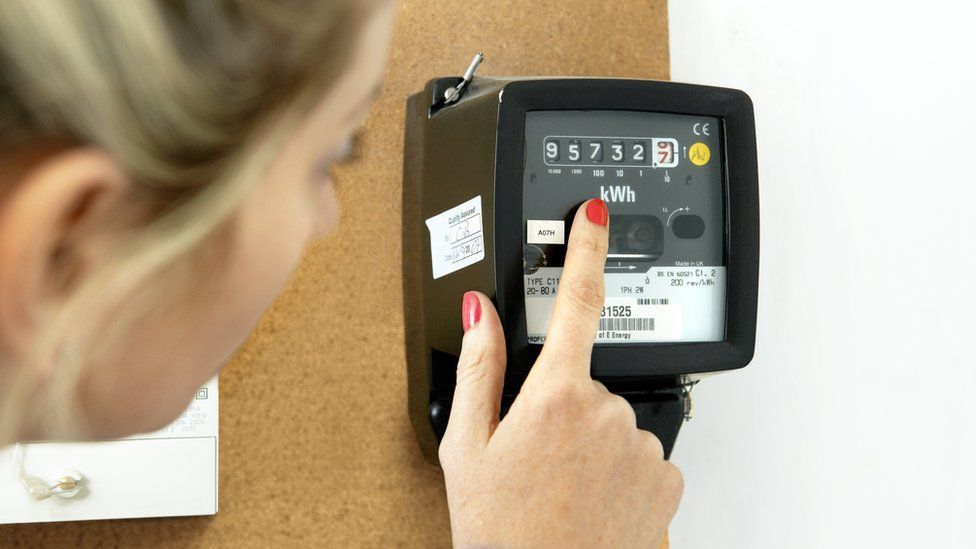
Energy bills to rise by at least £139 for millions of households
Regulator Ofgem said the price cap for default domestic energy deals would be raised to cover suppliers' extra costs.
The typical gas and electricity customer is likely to see their bill go up by £139 to £1,277 a year.
Charities warned the timing would hit struggling families hard, who already face losing an extra £20 a week from Universal Credit in October.
Prepayment customers will see an increase of £153, from £1,156 to £1309, the regulator said.
Ofgem chief executive Jonathan Brearley told the BBC: "The reason the price cap is going up is there has been a record increase in energy prices across the board, not just in gas and electricity but in petrol and diesel."
He urged customers to shop around for the best tariffs, saying there were big savings to be made by switching.
"You don't have to live with this tariff. The price cap is a backstop. We'd encourage any customer, particularly those struggling to pay their bills, to contact their supplier, and get access to a wide-range of help and support," he said.
"This is a devastating increase," said Peter Smith, director of policy and advocacy at fuel poverty charity National Energy Action.
"Millions of household budgets are already stretched to the limit and this massive increase could not be coming at a worse time."
Ofgem said rising wholesale costs were behind the increase, adding that the existence of the price cap meant households would save between £75-£100 a year.
The watchdog also pointed out energy users could switch to a better deal to save up to £200.
However, the Resolution Foundation says policymakers need to do more to help families who are close to the poverty line.
Jonathan Marshall, senior economist, said the government must focus on widening the current warm homes discount scheme, as well as reversing the planned removal of the £20 Universal Credit uplift. There should also be more targeted support for families at risk of falling into fuel poverty.
"A rise in in energy prices will disproportionately impact those who are already struggling," said Mr Marshall.
Who is affected?

The price cap, set twice a year by the regulator, affects 11 million households in England, Wales and Scotland who have never switched suppliers or whose discounted deals have expired. Northern Ireland sets its own cap.
That accounts for about half of all UK households. The remainder are on so-called fixed deals, which will not be affected.
Around four million prepayment meter customers will also be affected.
The cap sets the prices that suppliers can charge for each unit of energy, but that does not mean there is a limit to how much people can pay.
The more gas and electricity you use, the higher the bill.
Stark choice

"Finding an extra £20 a month for energy bills will leave me with a stark choice of paying for either food or fuel," says Anthony Lyman of Northampton.
The 35-year-old autistic single father of two adds: "We may have to have a cold house to have a full belly."
Anthony lost his job at a special needs school through ill-health at the start of the pandemic and has since been relying on Universal Credit and help with managing his finances from debt charity Christians Against Poverty, as well as being forced to turn to food banks.
"We've been relying on the Universal Credit uplift money to get by but the prospect of losing that £20 a week in October and having to pay more for gas and electricity will leave me on a financial knife-edge."
The energy industry has said there's plenty of help for vulnerable people like Anthony but he says in practice it's almost impossible to get it.
"We haven't been able to get in touch with anybody from our suppliers during the pandemic. You can only seem to talk to a computer and it's very difficult to tell a computer I'm struggling."
Why are prices rising?
Domestic energy bills are linked to wholesale prices, the price at which energy businesses have to pay for gas and electricity.
Wholesale prices have risen after gas prices soared to a record high as many economies recovered strongly from the Covid-19 crisis, prompting a surge in demand for energy.
When wholesale prices fell last summer following the first lockdown, Ofgem reduced the level of the cap by £84 for last winter.
But in February it increased the cap by £96 as wholesale costs rose.
Since then the wholesale cost of energy - which account for 40% of domestic bills - has climbed by more than 50%, which has led to the latest increase.
EDF, one of the UK's biggest energy providers, said the "unprecedented rate" at which wholesale prices were rising meant that customers would "at some point see the impact of this global trend".
A spokesman said: "We know this will be worrying news for customers of all suppliers - we will be directing financial assistance to those most in need through a £1.9m support fund, helping customers reduce their bills, manage their debt and even helping with costs for things like more energy efficient white goods."
The industry's trade body, Energy UK, said people worried about their bills should "pick up the phone and talk to your supplier".
Chief executive Emma Pinchbeck told the BBC's Today radio programme: "There's help and assistance available, particularly for those that are vulnerable and fuel poor." She also urged people to consider switching supplier, calling it a "straightforward" process.
The government also advised people to shop around for the cheapest tariffs, adding that it had simplified the process.
A spokesperson for the Business Department said: "To help consumers further, we plan to trial automatic switching for customers on expensive default tariffs to cheaper deals, and are extending the Warm Home Discount so an extra 750,000 households get £150 knocked off their bill each year."

When the energy price cap was introduced three years ago, it was hailed as a shield for customers against unscrupulous energy companies charging sky-high prices.
But this October, the cap will rise to its highest ever level, so is it working?
The cap applies to a company's default tariff, impacting people who never or rarely change their deal, and also those on pre-payment meters who often have less choice.
While it restricted expensive prices at some companies, there have been accusations that the cap gave other firms an excuse to raise their prices up to same level as the cap.
When fixing the cap point, the regulator says it must consider the wholesale price of gas and electricity so that companies can still make a profit. That's what they describe as setting a fair price.
The result is that we've seen more standardised pricing across energy companies at those top rates, but not necessarily a market that's cheaper for most customers.
With many people continuing to work from home through the autumn and winter months, and other budgets already being stretched with reductions to Universal Credit, this big jump in utility bills will be an unwelcome extra pressure.
Is switching the answer?

Energy users on variable tariffs could move to a different cheaper deal with their existing supplier or switch to another one to save up to hundreds of pounds.
Switching online is relatively simple: just use an energy comparison site and all you'll need is your postcode, the name of your current supplier, and the name of your current tariff.
But some vulnerable people may not be able to switch, warns National Energy Action.
"For some customers, switching is impossible due to levels of debt, or because pre-pay customers have far fewer options to switch supplier or tariff," added Mr Smith.
The charity has called on Ofgem to provide deeper protection for the most vulnerable customers.
"The UK government can also directly help reduce energy arrears as well as maintaining investment to reduce needless energy waste in our homes," he said.
Is it easy to switch my supplier?
Energy users can save hundreds by switching to a lower-priced fixed deal.
All suppliers have fixed-rate deals, so the simplest way to save is to contact your existing supplier and ask to be moved to its lowest-priced fixed deal.
But you could probably save more by switching to a rival, Ofgem says.
It's simple to switch using an energy comparison site - all you'll need is your postcode, the name of your current supplier, and the name of your current tariff.
Citizens Advice has a useful guide to choosing the right tariff. Ofgem also sets out the steps you should take to switch energy supplier and shop for a better deal.










